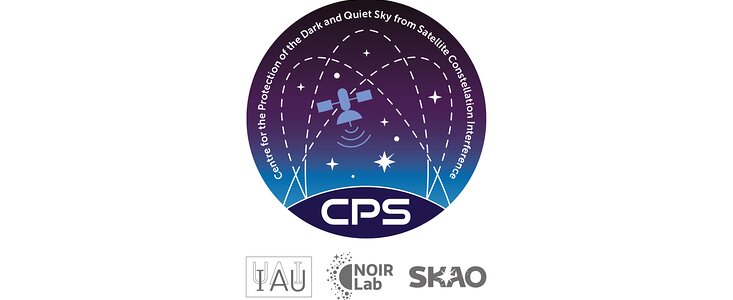Launch of New IAU Centre Safeguarding Astronomy from Satellite Constellation Interference
Virtual centre launches with new website and logo
10 June 2022
The International Astronomical Union (IAU)’s newest specialist centre, the Centre for the Protection of the Dark and Quiet Sky from Satellite Constellation Interference (CPS), is being launched. It is co-hosted by NSF’s NOIRLab and the SKA Observatory (SKAO).
Essentially a coordination centre, the CPS will oversee contributions from staff members across its two locations: NOIRLab’s Headquarters in Tucson, Arizona, USA, and the SKAO’s headquarters at Jodrell Bank, UK. The Centre is headed by former IAU General Secretary, Piero Benvenuti of the University of Padova, with Connie Walker from NOIRLab and the SKAO’s Federico Di Vruno serving as co-directors.
The CPS aims to mitigate the negative impact of satellite constellations on professional ground-based optical and radio astronomy observations as well as humanity’s appreciation of the night sky. The SKAO will focus on radio interference while visible light and infrared interference will fall under NOIRLab.
Although ground-based observations have been impacted by satellite interference before, the risk has grown dramatically with the launch and planned launch of large numbers of satellites in low Earth orbit to provide broadband services. Since such satellite constellations impact observations across borders, solutions must be found at the international level.
The CPS builds on the work carried out by the two host institutions and the astronomy community in general, recognising the various interests of different observatories according to wavelength, existing regulations, and expected impact.
The CPS aims to become the leading voice for astronomical matters that relate to the protection of the dark and quiet sky from satellite constellations and to act as a hub of information and resources to which any stakeholder group, including the constellation satellite industry, will be able to contribute and from which they can draw in support of their own activities. The mission of the CPS is to coordinate efforts and unify voices across the global astronomical community with regard to the protection of the dark and quiet sky from satellite constellation interference.
Director Piero Benvenuti says: “The opening of the CPS website to the public is an important step towards the full operation of the centre: it provides a synthetic description of the activities of its four “Hubs” which will be very useful for the prospective Contributing and Affiliated Members of the CPS in choosing how and in which areas they can contribute. We invite any interested party to fill in and submit the application form. Those received by 15 July 2022 will be considered for the first round of selection. The CPS is looking forward to a very fruitful collaboration with all of you!”
Co-director Connie Walker from NOIRLab says: “Three years ago SpaceX launched the first 60 Starlink satellites. The number of satellites from this and other companies is increasing exponentially and impacting the field of astronomy. During the last two years, four key workshops identified issues and recommended mitigation solutions with the help of astronomers, satellite industry folk, space lawyers and people from the general community worldwide. It is our pleasure to help them continue their work through CPS.”
“We are proud to officially launch the IAU CPS following months of work,” said its co-director Federico Di Vruno, who is also the SKAO’s spectrum manager. “There is considerable momentum in both the astronomical community and industry to find ways to mitigate interference and the response from policymakers is also positive, as demonstrated recently at the United Nations Committee on Peaceful Uses of Outer Space. We now need to transform all the goodwill into implementable actions.”
More information
NSF’s NOIRLab(National Optical-Infrared Astronomy Research Laboratory), the US center for ground-based optical-infrared astronomy, operates the International Gemini Observatory(a facility of NSF, NRC–Canada, ANID–Chile, MCTIC–Brazil, MINCyT–Argentina, and KASI–Republic of Korea), Kitt Peak National Observatory (KPNO), Cerro Tololo Inter-American Observatory (CTIO), the Community Science and Data Center (CSDC), and Vera C. Rubin Observatory(operated in cooperation with the Department of Energy’s SLACNational Accelerator Laboratory). It is managed by the Association of Universities for Research in Astronomy (AURA) under a cooperative agreement with NSF and is headquartered in Tucson, Arizona. The astronomical community is honored to have the opportunity to conduct astronomical research on Iolkam Du’ag (Kitt Peak) in Arizona, on Maunakea in Hawai‘i, and on Cerro Tololo and Cerro Pachón in Chile. We recognize and acknowledge the very significant cultural role and reverence that these sites have to the Tohono O'odham Nation, to the Native Hawaiian community, and to the local communities in Chile, respectively.
Links
- Website for Centre for the Protection of the Dark and Quiet Sky from Satellite Constellation Interference (CPS): cps.iau.org
Contacts
Piero Benvenuti
Director of the IAU Centre for the Protection of the Dark and Quiet Sky from Satellite
Constellation Interference
Email: piero.benvenuti@cps.iau.org
Connie Walker
Co-Director of the IAU Centre for the Protection of the Dark and Quiet Sky from Satellite
Constellation Interference, NSF’s NOIRLab/IAU
Email: connie.walker@cps.iau.org
Federico Di Vruno
Co-Director of the IAU Centre for the Protection of the Dark and Quiet Sky from Satellite
Constellation Interference, SKAO
Email: federico.divruno@cps.iau.org
Lars Lindberg Christensen
Head of NSF’s NOIRLab Communications, Education & Engagement/IAU Director of Communications
Tel: +1 520 461 0433/+49 173 38 72 621
Email: lars.christensen@noirlab.edu


